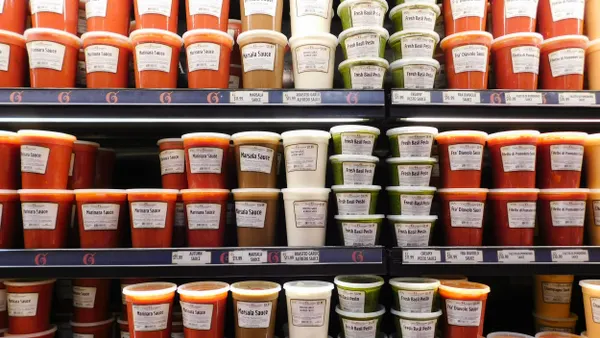BOSTON — Avid followers of the department store sector got a surprise last week when Macy's announced it would be partnering with ThredUp to sell secondhand clothing in its stores, followed a day later by a similar announcement from J.C. Penney.
Both retailers will be piloting sales of secondhand clothing in a select number of stores (40 and 30 for Macy's and J.C. Penney, respectively), and while they cited the partnership as an attraction for value-oriented customers, ThredUp co-founder and CTO Chris Homer put it more bluntly.
"What's their incentive? Foot traffic," Homer said during a panel at the eTail East conference on Tuesday. "Right now, the typical Macy's assortment — I don't know officially — but probably gets recycled monthly maybe, quarterly most likely. We are sending them product to refresh the ThredUp shop every week. So that's an incentive or a reason to bring customers back to actually shop."
It's a similar value proposition to the treasure hunt atmosphere of off-price retailers, which are not-so-coincidentally stealing share (and traffic) from department stores. Indeed, the sector has done so well that some department stores' off-price units seem to be better off than the core business, including Nordstrom Rack, which consistently outperforms the flagship brand (though in the first quarter, even Nordstrom Rack couldn't avoid falling sales).
For Macy's, the ThredUp partnership also mirrors its approach to Macy's Backstage, which for the past few years has been to launch the concept within existing stores to help make those locations more productive. And if department stores need anything right now, it's foot traffic.
J.C. Penney in particular could use a boost, after Moody's downgraded the retailer deeper into distressed territory in June and its second quarter earnings gave analysts little reason to look for a speedy recovery. The retailer has benefited from shop-in-shops in the past, in particular through its partnership with Sephora. Replicating that move with ThredUp could prove to be another strong way to drive customers back to stores.
In addition to the traffic boost, ThredUp's Homer believes there's another benefit to the recently announced partnerships.
"They also get to talk about — and I think it's true — that they're engaging and trying to figure out the role that they can play in a more sustainable fashion ecosystem," Homer said in reference to Macy's. "So I think there are two benefits that they enjoy from it."
Both Macy's and J.C. Penney said as much in their announcements. Macy's CEO Jeff Gennette noted during his announcement that the pilot was a response to sustainably-focused consumers who are drawn to the second-hand market. J.C. Penney's Chief Merchant Michelle Wlazlo said the ThredUp sales were "catering to eco-minded consumers who want more sustainable options in their wardrobe."
The move toward sustainable fashion could prove beneficial for both retailers, as environmentally friendly practices get more popular with consumers who want to feel good about where they shop. As the nascent partnerships kick off, though, all eyes will be on how they affect traffic and whether the new sections bolster or cannibalize sales from the core business.
Additionally, a report on Wednesday by Reuters stated that ThredUp received $175 million in funding which it will use to broaden its resale clothing services.














